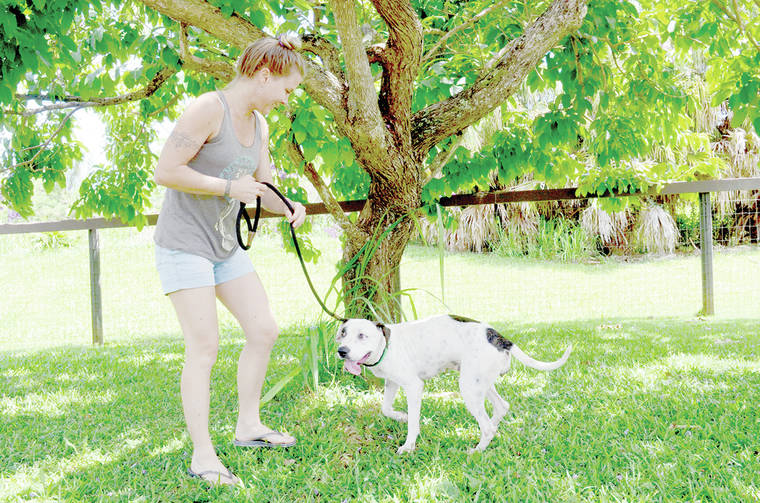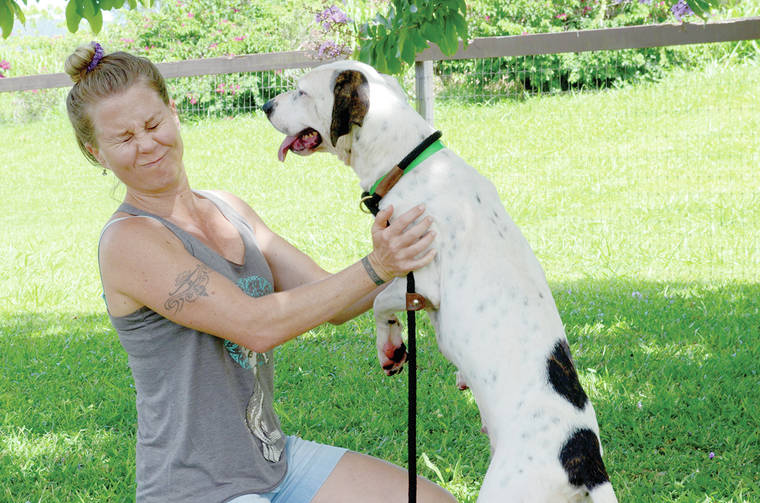More partners, less euthanasia


PUHI — A fundamental change at Kauai Humane Society is credited with reducing euthanasia rates over the last fiscal year.
July marks the beginning of the 2019/2020 fiscal year, and with one month to go, KHS has dropped those euthanasia numbers by 662 animals; from 1,548 to date in FY 2017/18 to 866 to date in this current FY 2018/19.
Broken down into type of animal, KHS euthanized 142 dogs to date in the current FY, down 122 from the last FY, which ended with 264 dogs euthanized. The entity has euthanized 744 cats in the current FY, down 540 from last FY when 1,284 cats were euthanized.
KHS Executive Director Mirah Horowitz says most of that change can be attributed to a change in philosophy at KHS.
“Basically, the overall theme is that KHS is putting an ever-increasing emphasis on saving as many animals as we can, and working with our supporters to come up with the resources needed to do so,” she said.
Two other big shifts have happened at KHS — an increase in social media promotion of the animals, and an increase in mainland transfer partners that have been helping out with some costs.
“Since October of last year, we have a lot more transfer partners and we have transfer partners that are helping out with the cost of the flight,” Horowitz said.
KHS now has about eight steady mainland transfer partners, though the number fluctuates, and many of those are on the hunt for animals to fill their foster homes and shelters.
“Some parts of the mainland have been more successful in their spay and neuter, they need animals for shelters and rescues,” Horowitz said. “It’s supply and demand.”
Many of those shelters are in a position to charge in the $300 and $400 range to adopt a dog, instead of the $110 – $135 KHS charges. It’s those shelters that KHS has been targeting as transfer partners.
“It’s finding those partners that charge larger adoption fees,” Horowitz said.
The non-profit dog rescue, Dog Gone Seattle, is one of those partners. Dog Gone has been taking about 10 dogs from KHS monthly since October. They charge between $300 and $500 for dog adoptions and pay $200 of the cost to transport the dog.
The average cost of transporting a dog to the mainland from Kauai — KHS is using Hawaiian Airlines and Alaska Airlines — ranges between $300 and $400.
Dog Gone takes dogs from Texas and California as well.
“It’s interesting from our perspective, it’s a different kind of dog. They have their own look — medium-sized, shy dogs. You can tell they’ve mostly been outside. Those are the ones we’re getting,” said Jenny Nordin, director of Dog Gone Seattle. “It’s been good. We like to share the cost among everyone. Don’t want the shelters to be in a situation where they can’t help the dogs and our market supports the adoption fee.”
Adopting rescues are more popular than buying a dog from a breeder in their area, Nordin said, so the demand stays high. The organization uses foster homes to house the dogs and usually have about 90 in the rescue at any given time. They take in about 50 dogs a month from out of state rescues. The Hawaii ones, though, are special.
“People have a heart for shy dogs and they don’t tend to have a lot of aggression problems,” Nordin said.
Since October, KHS has recouped $14,640 in reimbursements for transport.
By saving money on transfer, KHS has more for veterinary care.
For example, two senior dogs with serious eye injuries have come through KHS’s doors in the past couple months. They both were treated and are now on the mainland awaiting adoption.
A puppy named Florida is another example; she’s awaiting adoption on the mainland, but came to KHS with crooked front legs. He required an orthopedic specialist — something Kauai doesn’t have on island.
On one social media post alone, $945 was raised for Florida’s medical needs. That’s another shift in KHS’s practices: using social media to fund raise.
“We did a (social media) fundraiser so we could help the receiving rescue with funds needed to get him to the orthopedic specialist,” Horowitz said. “We’re saying that we are invested in this animal. It’s about funding and resources.”
Horowitz says instead of asking the question” should we save this animal,” now KHS is asking “how do we save this animal?”
“Do we need to amputate a leg to make it adoptable? Do we need to reach out to specialized transfer partners? How can we leverage resources on a national level to save as many animals as we can on this island,” Horowitz said.
Over the past fiscal year, KHS has had a slight dip in intake numbers, though there’s less than a month to go in the fiscal year. Intakes for FY 17/18 were 3,083; so far this FY, KHS has taken in 2,974 animals.
Adoptions for the FY to date are at 834. Of those, 421 have been dogs and 413 cats. In FY 17/18, 821 animals were adopted. Of those, 440 were dogs and 381 were cats.
Return to owner for the fiscal year to date is 486 — 400 dogs and 86 cats — versus last fiscal year’s 362 dogs and 90 cats.
Transfers for the FY to date are at 595 animals. Of those, 287 have been dogs and 308 were cats. Last fiscal year, 406 dogs and 318 cats were transferred to the mainland.
KHS is using the transfer program to send out dogs and cats that are unlikely to be adopted on Kauai.
That in turn puts more animals onto the KHS adoption floor.
“Animals that wouldn’t have had a solution now have a solution through the transfer program,” Horowitz said.
•••
Jessica Else, environment reporter, can be reached at 245-0452 or jelse@thegardenisland.com.



